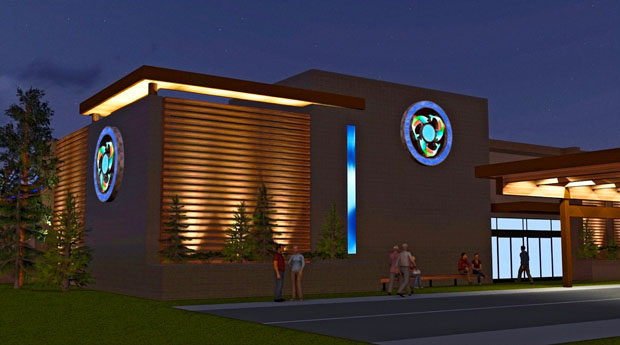BY JON BELL
Oregon tribes still bet on casinos.

BY JON BELL
Come next spring, residents and visitors to the coastal city of Coos Bay will have a new way to roll the dice.
The Confederated Tribes of Coos, Lower Umpqua and Siuslaw Indians have broken ground on what will be their second casino, a 15,000-square-foot operation known as Three Rivers Casino Coos Bay. Unlike the tribes’ other casino, Three Rivers Hotel and Casino in Florence, the new building won’t offer slot machines or card games, but, instead, 250 of the latest electronic bingo games, which mimic slot machines.
The distinction — the former casinos are considered Class III, the latter Class II — allows Oregon tribes to open more than the one traditional casino allotted to each of the state’s nine recognized tribal groups.
The $10 million project, backed in part by an Alabama tribe called the Poarch Band of Creek Indians, will employ up to 80 people full-time and have a payroll of close to $1.5 million, according to Bob Garcia, chair of the tribal council.
“It’s not 500 [new jobs], but it’s definitely going to be an added boost to the economy,” he says. Garcia didn’t have an estimate for what the new casino might generate in revenue. A 2014 report on gaming by the accounting firm RubinBrown noted that average revenue of the 49 tribal casinos in Oregon, Washington, Idaho and Alaska was just over $58.6 million per casino. As a Class II casino, the new one in Coos Bay will likely generate less than that.
Even so, it will help fill the tribe’s coffers, just as casinos do for tribes across the state. According to Michael Burton, executive director of the Affiliated Tribes of Northwest Indians Economic Development Corporation, casinos are by far the largest moneymakers for tribes. It’s wrong, however, to think that tribes are just raking in their casino winnings hand over fist.
“Most people see the casinos generating big piles of money and think the tribes must be rich,” he says. “But the tribes offer the largest range of services of any local government, and they run some services — hospitals, education programs — that governments rarely run anymore.”
Because the casinos are so lucrative for the tribes, they tend to focus a lot of their resources and attention on them. Though the Old Camp Casino of the Burns Paiute Tribe closed its doors a couple years ago — albeit temporarily — other tribal casinos around the state have been well tended to.
A few years back, the Confederated Tribes of the Umatilla Indian Reservation’s Wildhorse Resort & Casino in Pendleton got a $45 million upgrade; the Siletz Tribes updated the hotel rooms at Chinook Winds last year, and the Coos, Lower Umpqua and Siuslaw tribes spent close to $20 million to expand the Three Rivers Casino and Hotel with a golf course, new rooms, an RV park and more this year.
With the opening of the new Three Rivers casino in Coos Bay and a similar Class II that’s been proposed in Medford by the Coquille Indian Tribe, there’s a natural tendency to think that Oregon’s tribes may be relying too heavily on casino cash.
On one hand, they do. And why not? According to Burton, the returns from a successful casino soar above those of average businesses. Still, tribes know that gaming can be competitive — the Oregon Lottery has more slot machines than all nine of the tribes combined, for example — and that it’s best not to bet all their money on one hand.
“There is a belief in Indian country that this is a fleeting phenomenon and they need to diversify,” Burton says. “Tribes would like to move beyond casinos.
Fleeting may be the wrong adjective, as most tribal casinos in Oregon have been around since the early 1990s, though Three Rivers didn’t open until 2004. Total revenues from tribal casinos have been on the slow rise, too. According to economic analysis reports done by ECONorthwest, total tribal casino revenues were about $499 million in 2004; in 2011 they topped $561 million.
Even so, many tribes are already broadening their portfolios. Several years ago, the Umatilla launched Cayuse Technolgies, an onshore software development and help-desk center. They, along with the Warm Springs tribes, have started to look into renewable-energy projects like wind turbines and biomass facilities. The Coquille are using casino revenues to buy forestland, and in Coos Bay, the same tribes that are opening the new casino are also spearheading a redevelopment project that could bring a boutique hotel and other tourist attractions to a historic spot on the bay known as the “hollering place.”
“We have been looking to diversify,” Garcia says. “We’re only 30 years from restoration [as a tribe], but we’re looking for opportunities. It just takes time to build those opportunities.”

